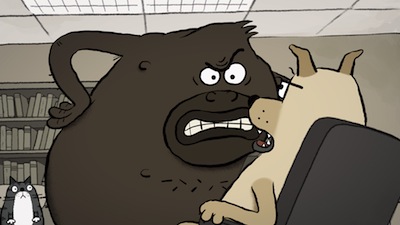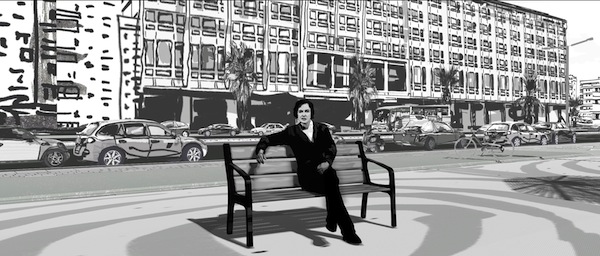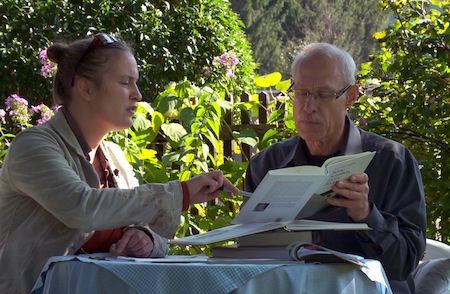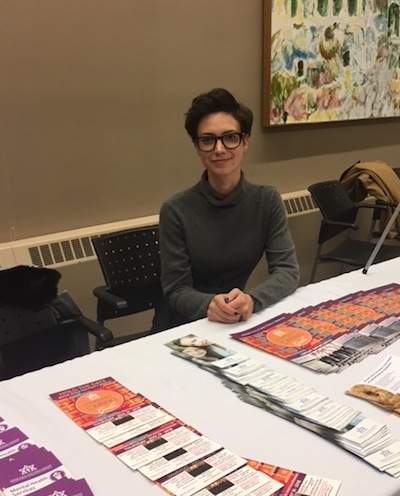Mélanie Thierry delivers a strong performance as Marguerite Duras in Memoir of War. (photo from VIFF)
The Vancouver International Film Festival starts next week. Among the myriad offerings are many films that might be of particular interest to the Jewish community. Here, we review four: In My Room, Memoir of War, The Reports on Sarah and Saleem and Working Woman.
Not to be confused with In My Room (Germany), about a man who wakes up one day to find that everyone else in the world has apparently disappeared, which is also playing at VIFF, In My Room (Israel) introduces viewers to six teens who are, in my view – and likely that of anyone over 40 – way too eager to share on social media. In an effort to become marginally famous, perhaps, or, at best, to find or give support to others, they expose their insecurities, their challenges and changes, and more. Both compelling and hard to watch at times, one thing the documentary makes very clear – growing up these days isn’t easy.
In My Room is part of VIFF’s Impact stream, nine films that the festival considers “uncompromising” and “insightful discussions that spark action and change the way we see the world.” Among the awards being offered in this category is the VIFF Impact Award, a $5,000 prize presented by Leonard Schein to one of the stream’s documentaries. In My Room certainly shines an uncompromising light on the personal information that is being shared on the internet by kids, the publicizing of which may come back to haunt them.
While a large part of me cringes at the teens’ apparent lack of boundaries or concern for their safety, they are also incredibly brave (or maybe just incredibly ignorant of the possible consequences). I hope that only a small percentage of young people are going through what they are, which ranges from heartbreak over an ended relationship, to pregnancy to not being comfortable in the gender they were born, to an eating disorder.
In My Room is in English and Hebrew (with English subtitles). It is rated PG for coarse and sexual language, and screens Sept. 29 and Oct. 1.
* * *
Memoir of War (France/Belgium) sees its Canadian première at VIFF. A little on the slow side pacing-wise, it is a seemingly realistic portrayal of what it might have been like living in Paris during its occupation by the Nazis. It is based on Marguerite Duras’s wartime memoir La Douleur (Pain).
The film takes place in 1944. Duras’s husband, Robert, part of the resistance, has been captured by the Nazis and she is so desperate to find out what has happened to him, and to possibly free him, that she dangles the hope of a relationship as bait to get information from a man named Rabier, an open Gestapo collaborator. Rabier not only desires Duras, but, even more, entry into her literary world.
When the Allies’ impending victory becomes apparent, Rabier flees. As liberation takes hold and survivors begin to return, but not Richard, Duras becomes ill, feverish, and reality and dreams blur.
The acting is superb, in particular Mélanie Thierry as Duras, and director Emmanuel Finkiel and cinematographer Alexis Kavyrchine deftly capture her moments of fear, exhaustion and confusion symbolically in a powerful use of imagery and visual effects, which dialogue alone could not have communicated.
Memoir of War is in French with English subtitles. It screens Oct. 6 and 8.
* * *
Though inspired by true events, The Reports on Sarah and Saleem is a little hard to believe. Not the reaction of a husband to his wife’s infidelity. Not the fact that an Israeli or a Palestinian would have an affair with the supposed enemy. But that a nice, educated and industrious woman would risk her marriage and business to be with such a grumpy, pushy and uninspiring man.
Sarah, an Israeli wife, mother and café owner, is having an affair with married, soon-to-be-a-father Saleem, a Palestinian deliveryman for a bakery, and then for his relative’s unsavoury friends. The appeal of great sex is understandable but the scenes in the back of the delivery van don’t succeed in making it seem life-riskingly great.
Despite the cognitive dissonance, the pace and tensions build up, and the second half of the film, which features less driving around and some gun-toting drama, is quite engaging. When things go south, will Sarah tell the truth, and risk losing everything she holds dear, or stay quiet, and let her lover go to prison for a crime he didn’t commit?
The Reports on Sarah and Saleem is in Arabic, Hebrew and English, with English subtitles. It screens Oct. 7 and 11.
* * *
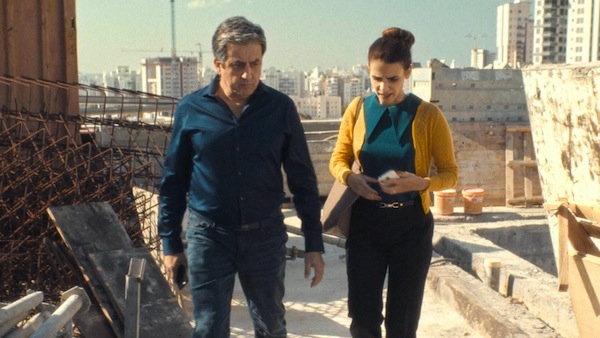
I can’t even look at the stills of actor Menashe Noy, who plays Benny in Working Woman, without feeling disgusted, so well did he play the lecherous boss of Orna (Liron Ben Shlush), a smart, married, mother-of-three, who Benny hires as his assistant.
At first, Benny is the good guy, the man who sees great potential in the inexperienced Orna. Her former commander in the army, he hires her at his development firm, and Orna excels as a salesperson. This is part of what attracts Benny to her – her intelligence and natural ability. But he can’t control his desire and he tries to take what he wants. Orna must figure out how to extricate herself from the untenable situation without ruining her career opportunities.
For some reason, I was expecting a dramatic thriller, where Orna exacts some horrible but deserving punishment on her harasser, but Working Woman is less dramatic than that. Orna uses her brains to get what she needs to move on, both workwise and psychologically. While it would have been refreshing if the character of Orna’s husband had been written as one more sympathetic to her plight, the film is probably more realistic as it is.
Working Woman screens Oct. 8 and 10.
* * *
Some of the other films that are of special interest to the Jewish community include The Oslo Diaries, presented by the Israeli Consulate General, Toronto and Western Canada, with the Jewish Independent as media partner, which screens Sept. 28 and 29, and Oct. 12 (jewishindependent.ca/oslo-diaries-peace-possible); Animal Behaviour Oct. 1 and 8 (jewishindependent.ca/animated-therapy-session); and The Washing Society Oct. 4 and 6 (jewishindependent.ca/bringing-the-invisible-to-light). For the full VIFF schedule, visit viff.org.




